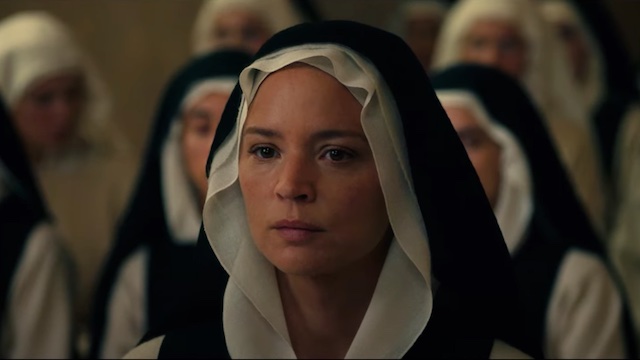Besides being the fairground of luxury and class, the Cannes Film Festival is also perceived as a place where it is safe to show outrageous works that break free from social boundaries. In that regard, Paul Verhoeven’s Benedetta is that kind of movie that perfectly fits the “it’s a Cannes film” label. Following the commercial success of Elle, Verhoeven helms his second French movie. Unlike his first foray, Verhoeven fails to provide meaning to his controversial work this time out.
Based on an academician Judith C. Brown’s Immodest Acts – The Life of a Lesbian Nun in Renaissance Italy, the story follows the life of a 17th-century nun portrayed by Virginie Efira. Benedetta entered the monastery of Pescia when she was a little child, driven by her unshakable faith. Her life changes after saving the life of Daphne Patakia’s young shepherdess, Bartolomea, who joins the ranks of the convent and brings a breath of wild recklessness inside those walls. As a new visceral passion arises in her, Benedetta starts having carnal thoughts of the new novice. At the same time, she starts having visions and soon is blessed with the stigmata. She becomes known as one of the most saint nuns in the land while constantly breaking her vow of chastity, but her double life might not last long as the eyes in the monastery’s walls never sleep.
While Belgian actress Efira puts on a good performance for the egoistic Benedetta, it’s Patakia who steals the show with her vehemence. The protagonists are as different as day and night, but together they are an explosive mix. It’s easy to see that the noble Benedetta is poised, icy, and conniving, while the commoner Bartolomea is uncouth but bursts with passion, eager to discover her sexuality. The young nuns live in a cruel world where they aren’t allowed to explore their lesbian love so that they find a way to be free by duping all their enemies.
On the notes of the beautiful score by Anne Dudley, Verhoeven attempts to mix sacred and profane in an ambiguity between what’s real and what’s not. The focus should have stayed on the love between the protagonists but this historical movie attempts to undertake too many topics at once, resulting in a product that uses blasphemy to hide the confusion at the base. The Dutch director takes upon himself to subvert some of the Christianity cannon by presenting his vision of Jesus, often seen as a violent warrior who doesn’t mind using a sword. The climax comes when the young protagonists turn a wooden Holy Mary statue into a sex toy to give each other pleasure. That scene was thought to tickle some hidden desires in the watchers, but it results in just free blasphemy.
Given that some of its characters and situations are so exaggerated, it’s hard to take this movie seriously. They end up being comical, a parody of themselves. The prominent example is Lambert Wilson’s Nuncio, an accumulation of clichés on religion and the Italian Renaissance. It appears that fans will have to wait for The Matrix 4 to see how good can this actor be at portraying a well-scripted villain.
There’s an abundance of sex in the film, perhaps too much. Gerard Soeteman, who worked on the first draft of the script, asked to be removed from the credits and left the project. Ultimately, the sensation is that you have spied like a voyeur some things that were meant to be kept secret. Long gone are the days where Verhoeven amazed the world with his audacity in Basic Instinct, nowadays it appears that the Dutch director only abuses sexual scenes to hide the vacuity of his story.
Score: 5/10
As ComingSoon’s review policy explains, a score of 5 equates to “Mediocre.” The positives and negatives wind up negating each other, ultimately making it a wash.
Disclosure: The critic attended a screening at the Cannes Film Festival for the Benedetta review.










